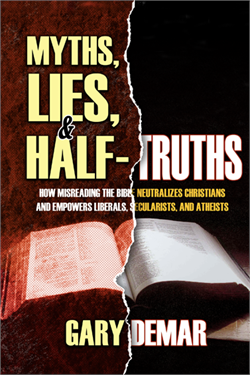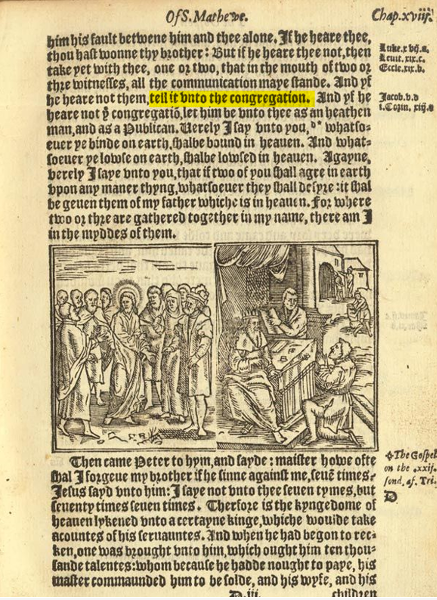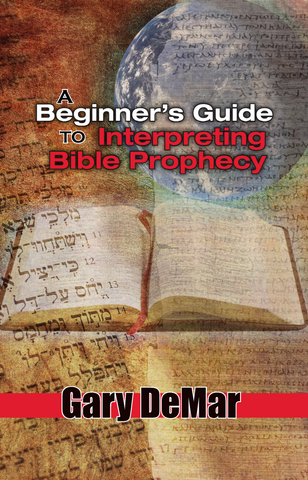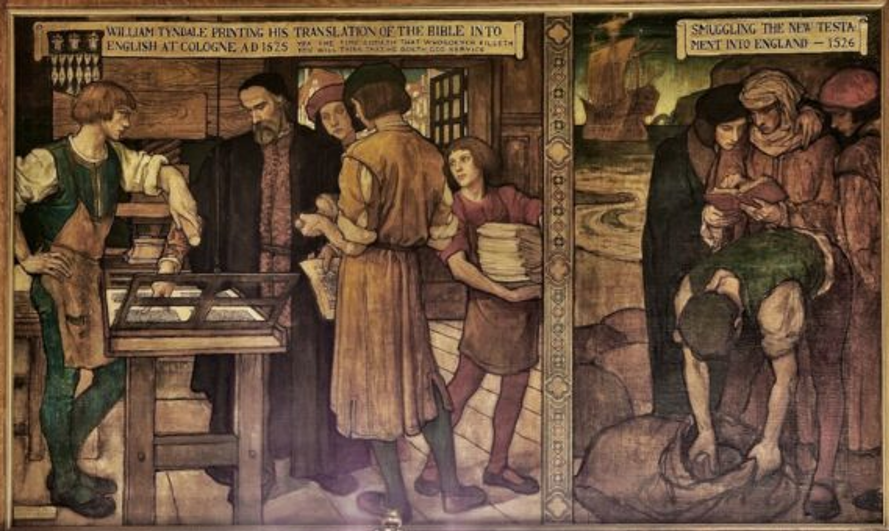A new study claims the Church of England is leaning towards a decision to drop the word “church” in favor of a more “relevant and modern sounding” identity. “The report from the Centre of Church Planting Theology and Research suggests when creating new places of worship, the Anglican church is more likely to discuss them as ‘communities’ and ‘congregations.’” I believe it’s the right move but for the wrong reason. The Church of England sees the change in identity as a marketing move. The decision doesn’t have anything to do with biblical accuracy related to the proper translation of ekklēsia. Translating the Greek word ekklēsia as “church” was a horrendous decision by the translators. Unbeknownst to most people, however, the translators were forced to translate ekklēsia as “church.”

Myths, Lies, and Half-Truths
Myths, Lies, and Half-Truths takes a closer look at God's Word and applies it to erroneous misinterpretations of the Bible that have resulted in a virtual shut-down of the church's full-orbed mission in the world (Acts 20:27). Due to these mistaken interpretations and applications of popular Bible texts to contemporary issues, the Christian faith is being thrown out and trampled under foot by men (Matt. 5:13).
Buy NowThe Greek word ekklēsia was not a new word in the New Testament. It’s the Greek equivalent of the Hebrew word qahal and means “assembly” or “congregation.” William Tyndale (1494-1536) translated ekklēsia in his 1525 edition of the New Testament as “congregation" except for Acts 14:13 and 19:37 where he used “churche” to mean a pagan place of worship. The religious establishment did not like Tyndale’s translation. The image above is a painting of Tyndale printing the Bible and it being smuggled into England. The painting is located in the Governor’s Grand Executive Reception Room in the Pennsylvania State Capitol. Tyndale’s NTs were smuggled in bales of cotton and distributed across England. In an effort to control the spread of Tyndale’s work, King Henry VIII and the religious establishment burned every copy they could get their hands on.
In 1529 [Thomas] More wrote a treatise, the Dialogue Concerning Heresies and Matters of Religion, in which he attacked the vocabulary of the new English Bible. More chided Tyndale for “mistranslating” several words of theological importance: the translator used “love” instead of “charity” for the Greek word agape, “senior” or “elder” instead of “priest” for presbyteros, and “repentance” instead of “penance” for the Greek metanoia. As one biographer observes, More declared Tyndale guilty of deliberately replacing theological terms with words not normally used by theologians.[1] And More tried to show that by means of these “radical” translations Tyndale was subverting the authority of the church and its doctrines.[2]
Following More’s arguments, one of the requirements of the translators of the so-called Authorized or King James Version was that ekklēsia had to be translated as “church.” Rules to be Observed in the Translation of the [King James] Bible required the following: “The old Ecclesiastical Words to be kept, viz. the Word Church not to be translated Congregation &c.”[3]
As William Stafford writes, it was understood by the laity and church officials that “it was the clergy who were the ecclesia, the church.”[4] But as Tyndale saw it, “the church was not the clergy, nor was it the hierarchical, legal, and ceremonial edifice sustaining the clergy, but rather the congregation of all who responded to the word of God.”[5] If translators had followed Tyndale, there never would have been dispensationalism’s Israel-Church distinction.
The Hebrew translation of the New Testament translates the Greek ekklēsia as qahal (קָהָל), meaning “assembly” or “congregation.” The TLV (Tree of Life Version), published by the Messianic Jewish Family Bible Society, translates Matthew 16:18 as “community” and 18:17 as “Messiah’s community” and not “church.” The same is true of Acts 5:11: “And great fear came over the whole community and all who heard these things.”

With this background, we can understand why Stephen could describe “the children of Israel” as the “ekklēsia [whole community] in the wilderness” (Acts 7:37-38). The KJV, beholden to the Rules to be Observed in the Translation of the [King James] Bible, translated ekklēsia as “church.” This alone proves that the so-called “church” was not something new in the New Testament.
Hebrews 2:12 quotes from Psalm 22:22. The Old Testament Psalm used the word qahal and the Septuagint translated it as ekklēsia:
I will tell of Your name to my brethren;
In the midst of the assembly [קָהָל/qahal] [church?] I will praise You.
The Septuagint (LXX), the Greek translation of the Hebrew Old Testament, translate qahal in Psalm 22:22 as ekklēsia.
Hebrews 2:12 reads this way in the KJV:
I will declare thy name unto my brethren,
in the midst of the church [ekklēsia] will I sing praise unto thee.
The ekklēsia was identified with Israel long before the inauguration of the New Testament Church (ekklēsia) that was initially made up exclusively of Jews (Israelites).

Beginner's Guide to Interpreting Bible Prophecy
With so much prophetic material in the Bible — somewhere around 25% of the total makeup of Scripture — it seems difficult to argue that an expert is needed to understand such a large portion of God’s Word and so many “experts” could be wrong generation after generation. If God’s Word is a lamp to our feet and a light to our path” (Psalm 119:105), how do we explain that not a lot of light has been shed on God’s prophetic Word and with so little accuracy?
Buy NowThe modern-day Israel-Church distinction is contrary to everything we find in the Bible. There is only one people of God and only one way of salvation for Jews and Gentiles. Today’s unbelieving Jews are no different from unbelieving Muslims, Hindus, Satanists, atheists, communists, pagans, or anyone else. All who are in Christ make up “one new man” (Eph. 2:15). All who are in Christ make up one olive tree (Rom. 11:17-24). Is God done with the Jews? He is no more done with the Jews than He is done with the world!
[1] C.H. Williams, William Tyndale (London: Nelson, 1969), 76.
[2] Riemer A. Faber, “William Tyndale’s Concept of the Church,” Christian Study Library (1994).
[3] Quoted in David Daniell, The Bible in English: Its History and Influence (New Haven, CT: Yale University Press, 2003), 439.
[4] William S. Stafford, “Tyndale’s Voice to the Laity” in Word, Church, and State: Tyndale Quincentenary Essays, 105.
[5] Stafford, “Tyndale’s Voice to the Laity,” 106.

